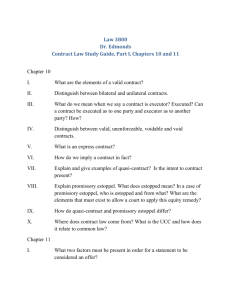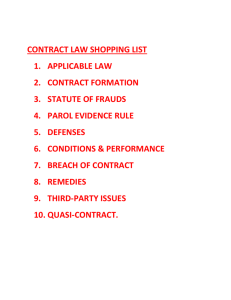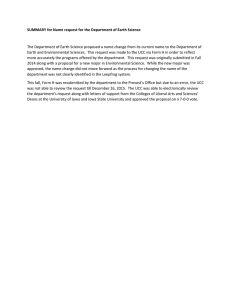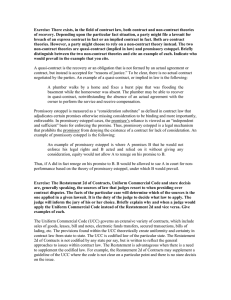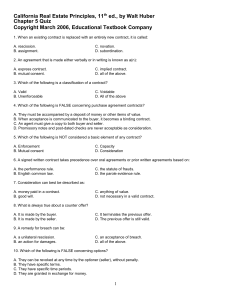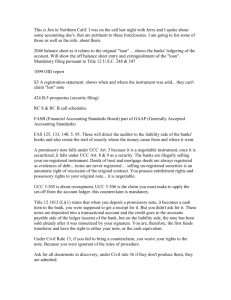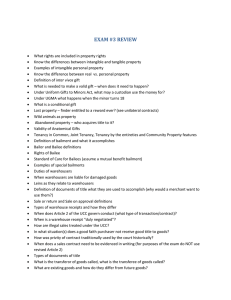I.
advertisement
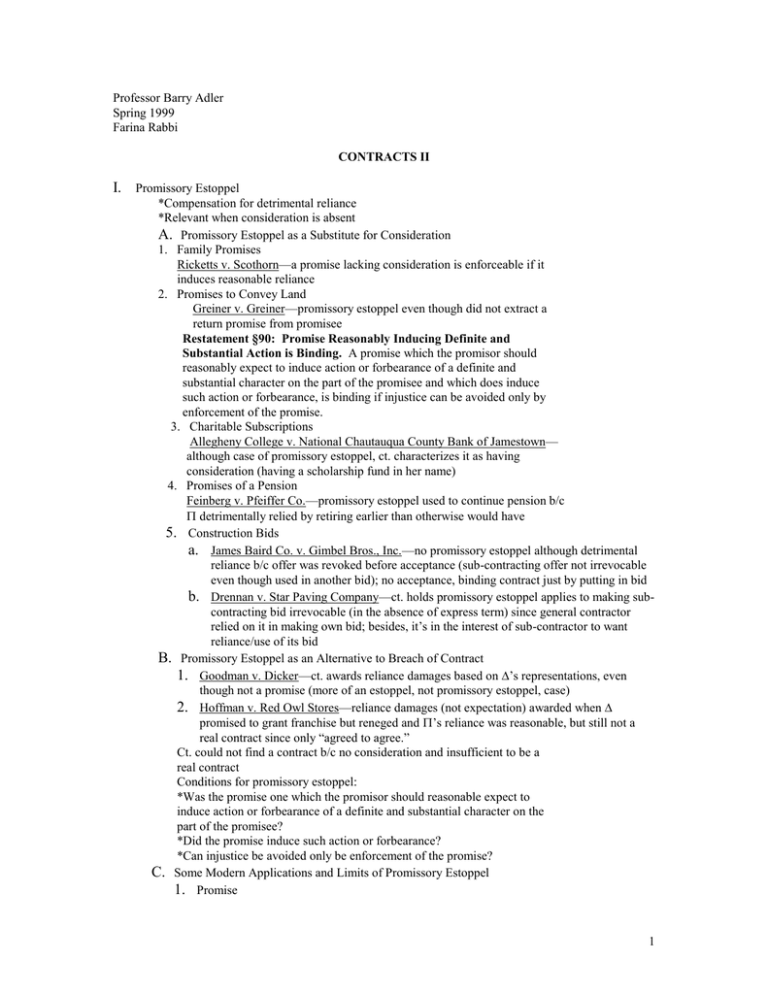
Professor Barry Adler Spring 1999 Farina Rabbi CONTRACTS II I. Promissory Estoppel *Compensation for detrimental reliance *Relevant when consideration is absent A. Promissory Estoppel as a Substitute for Consideration 1. Family Promises Ricketts v. Scothorn—a promise lacking consideration is enforceable if it induces reasonable reliance 2. Promises to Convey Land Greiner v. Greiner—promissory estoppel even though did not extract a return promise from promisee Restatement §90: Promise Reasonably Inducing Definite and Substantial Action is Binding. A promise which the promisor should reasonably expect to induce action or forbearance of a definite and substantial character on the part of the promisee and which does induce such action or forbearance, is binding if injustice can be avoided only by enforcement of the promise. 3. Charitable Subscriptions Allegheny College v. National Chautauqua County Bank of Jamestown— although case of promissory estoppel, ct. characterizes it as having consideration (having a scholarship fund in her name) 4. Promises of a Pension Feinberg v. Pfeiffer Co.—promissory estoppel used to continue pension b/c detrimentally relied by retiring earlier than otherwise would have 5. Construction Bids a. James Baird Co. v. Gimbel Bros., Inc.—no promissory estoppel although detrimental reliance b/c offer was revoked before acceptance (sub-contracting offer not irrevocable even though used in another bid); no acceptance, binding contract just by putting in bid b. Drennan v. Star Paving Company—ct. holds promissory estoppel applies to making subcontracting bid irrevocable (in the absence of express term) since general contractor relied on it in making own bid; besides, it’s in the interest of sub-contractor to want reliance/use of its bid B. Promissory Estoppel as an Alternative to Breach of Contract 1. Goodman v. Dicker—ct. awards reliance damages based on ’s representations, even though not a promise (more of an estoppel, not promissory estoppel, case) 2. Hoffman v. Red Owl Stores—reliance damages (not expectation) awarded when promised to grant franchise but reneged and ’s reliance was reasonable, but still not a real contract since only “agreed to agree.” Ct. could not find a contract b/c no consideration and insufficient to be a real contract Conditions for promissory estoppel: *Was the promise one which the promisor should reasonable expect to induce action or forbearance of a definite and substantial character on the part of the promisee? *Did the promise induce such action or forbearance? *Can injustice be avoided only be enforcement of the promise? C. Some Modern Applications and Limits of Promissory Estoppel 1. Promise 1 a. Blatt v. University of Southern California—case of no damages; no breach b/c did do what promised (to consider membership) & was not materially hurt by making better grades b. Spooner v. Reserve Life Insurance Co.—no breach of promise b/c there was a disclaimer clause which stated that co. can grant/withhold bonus at discretion c. Ypsilanti v. General Motors—a threat is not a promise (a threat to leave a promise to stay) 2. Reasonable Reliance Alden v. Presley—for promissory estoppel, the promisee must have acted reasonably in justifiable reliance on the promise. But the reliance itself becomes unreasonable when the promise is revoked. 3. Injustice of Nonenforcement Cohen v. Cowles Media Company—must sustain promise to prevent injustice (as a result of breach, lost his job & other detrimental effects). Although 1st Amend./free speech/press concerns, the press cannot disregard promises. 1st Amend. does not prohibit from recovering under promissory estoppel. Press subject to normal laws. II. Performance A. The Implied Duty of Good Faith Performance All contracts contain an implied covenant to perform in good faith. UCC § 1-203: Every contract or duty within the Act imposes an obligation of good faith in its performance or enforcement. UCC § 1-209(19): Good faith means honesty in fact in the conduct or transaction concerned. UCC § 2-103(1)(b): Good faith in the case of a merchant means honesty in fact and the observance of reasonable commercial standards of fair dealing in the trade. Restatement § 205: Every contract imposes upon each party a duty of good faith and fair dealing in its performance and its enforcement. UCC § 1-102(3): good faith obligations may not be disclaimed by agreement 1. Commercial Leases a. Goldberg Corp. v. Levy—violation of good faith when tenant tried to avoid liability for lease by intentionally mismanaging/diverting business b. Mutual Life Insurance Co. v. Tailored Woman—not a breach of good faith when tenant transferred some merchandise from leased premises (she was merely exercising her rights) c. Stop & Shop, Inc. v. Ganem—tenant allowed to discontinue business that is subject to gross-revenue rent (yet still lease premises) since there is no implied covenant to continue operations in the contract d. Food Fair Stores, Inc. v. Blumberg—duty of good faith does not prevent tenant from diverting/expanding business to other stores in neighboring area 2. Employment Contracts a. Monge v. Beebe Rubber Co.—duty of good faith extended to at-will employment context: termination of at-will employment motivated by bad faith and malice is breach of contract Since good faith is implied term in every contract, can only fire someone for cause/performance. b. Murphy v. American Home Products Corp.—although ct. upheld employer’s right to fire at will, recognized bases for firing that are statutorily, constitutionally proscribed B. Implied and Express Warranties 1. Implied Warranties of Merchantibility and Fitness for a Particular Purpose Agreement means the bargain of the parties in fact as found in their language or by implication from other circumstances including course of dealing or usage of trade or course of performance. UCC §1-201(3) Recall the hierarchy: express language, course of performance, course of 2 dealing, usage of trade. UCC §2-208, 1-205 Context of agreement matters in addition to explicit language. Terms may include not expressly in contract but implied through course of dealing, etc. UCC §2-314: Implied Warranty: Merchantibility, Usage of Trade: (1) Unless excluded or modified (Section 2-316), a wrranty that the goods shall be merchantable is implied in a contract for their sale if the seller is a merchant with respect to goods of that kind. (2) Goods to be merchantable must be at least such as (a) pass without objection in the trade under the contract description; and (b) in the case of fungible goods, are of fair average quality within the description; and (c) are fit for the ordinary purposes for which such goods are used; and (d) run, within the variations permitted by the agreement, of even kind, quality and quantity within each unit and among all units involved; and (e) are adequately contained, packaged, and labeled as the agreement may require; and (f) conform to the promises or affirmations of fact made on the container or label if any. (3) Unless excluded or modified other implied warranties may arise from course of dealing or usage of trade. UCC §2-315: Implied Warranty: Fitness for Particular Purpose Where the seller at the time of contracting has reason to know any particular purpose for which the goods are required and that the buyer is relying on the seller’s skill or judgment to select or furnish suitable goods, there is unless excluded or modified under next section an implied warranty that the goods shall be fit for such purpose. UCC §2-714: Buyer’s Damages for Breach in Regard to Accepted Goods (2) The measure of damages for breach of warranty is the difference at the time and place of acceptance between the value of the goods accepted and the value they would have had if they had been as warranted, unless special circumstances show proximate damages of a different amount. In a proper case any incidental and consequential damages under the next section may also be recovered. 2. Express Warranties UCC §2-313: Express Warranties by Affirmation, Promise, Description, Sample (1) Express warranties by the seller are created as follows: (a) Any affirmation of fact or promise made by the seller to the buyer which relates to the goods and becomes part of the basis of the bargain creates an express warranty that the goods shall conform to the affirmation or promise. (b) Any description of the goods which is made part of the basis of the bargain creates an express warranty that the goods shall conform to the description. (c) Any sample or model which is made part of the basis of the bargain creates an express warranty that the whole of the goods shall conform to the sample or model. (2) It is not necessary to the creation of an express warranty that the seller use formal words such as “warrant” or “guarantee” or that he have a specific intention to make a warranty, but an affirmation merely of the value of the goods or a statement purporting to be merely the seller’s opinion or commendation of the goods does not create a warranty. 3. Express Disclaimers of Warranty UCC §2-316: Exclusion or Modification of Warranties Seller can disclaim implicit warranties by writing conspicuously “as is.” Negation ineffective unless it can be read as consistent with the description. More favorable towards buyer since assume seller aware of the inconsistency. III. Breach A. Prospective Nonperformance 3 1. Anticipatory Repudiation—before the time for performance arrives, one party indicates to the other that she doesn’t intend to perform a. Hochster v. De La Tour—non-breaching party does not have to wait until performance to bring suit since it will benefit both parties and is more rational b. Harrell v. Sea Colony, Inc.—mere request for a change in the terms or a request for cancellation of the contract is not in itself enough to constitute a repudiation (can’t treat request for renegotiation as repudiation) 2. Adequate Assurances of Performance Scott v. Crown—quoting from UCC §2-609(1): Right to Adequate Assurance of Performance “When reasonable grounds for insecurity arise with respect to the performance of either party, the other may in writing demand adequate assurance of due performance and, until he receives such assurance, may if commercially reasonable suspend any performance for which he has not already received the agreed return.” But demand for assurances cannot be a means of forcing a modification. Adequate assurance as a flip side of material breach B. Material Breach material breach: a material failure of performance; when a breach has so impaired the interest in future performance that terminating the contract relationship is prudent, despite the disruptions and difficulties it may entail How much deviation is enough to relieve the non-breaching party of any obligation? B/c of concern that non-breaching party can never be made whole, allow nonbreaching party to get out of contract. 1. When is Nonperformance Material? a. Continental Grain Co. v. Simpson Feed Co.—case where buyer was required to give shipping instructions, but delayed. Price of soybeans rose; seller declared end of contract, claiming buyer’s material breach. Ct. held failure to give shipping instructions not a material breach b/c seller did not incur substantial damage as a result of the delay, buyer’s delay was not willful/negligent, delay did not manifest buyer’s inability to perform. Restatement §241: Circumstances Significant in Determining Whether a Failure is Material In determining whether a failure to render or to offer performance is material, the following circumstances are significant: (a) the extent to which the injured party will be deprived of the benefit which he reasonably expected; (b) the extent to which the injured party can be adequately compensated for the part of that benefit of which he will be deprived; (c) the extent to which the party failing to perform or to offer to perform will suffer forfeiture; (d) the likelihood that the party failing to perform or to offer to perform will cure his failure, taking account of all the circumstances including any reasonable assurances; (e) the extent to which the behavior of the party failing to perform or to offer to perform comports with standards of good faith and fair dealing. Adequate assurance gives party that feels insecure before the breach the right to prove assurance or will cancel contract. It’s always a right that one party gets beyond what the contract provides. UCC §2-609 enhances opportunity for strategic behavior since it gives 1 party the right to require things not required in contract. b. Leazzo v. Dunham—An unequivocal statement of a willful failure to comply with a required contractual term is a repudiation, even if the matter is minor. 2. The Perfect Tender Rule: Cure and Rescission UCC §2-601 permits rejection for any non-conformity. UCC §2-508(1) permits cure if prior to time for performance. 4 UCC §2-508(2) permits additional time to cure if seller had reasonable grounds to believe that original tender would have been acceptable with or without an adjustment in price. *Small breach shouldn’t matter enough to let non-breaching party get out of contract. UCC §2-513 gives the buyer a right of inspection. UCC §2-608 limits post-acceptance revocation to non-conformity that “substantially impairs the value” of the goods to the buyer and that the buyer had reason not to complain about earlier. Balance: protects buyer from defective tender but discourages strategic behavior. Once the buyer rightfully rejects or justifiably revokes acceptances, remedies follow from UCC §2-711. If the buyer does not or cannot rightfully reject or justifiably revoke, damages may still be had for non-conformity. See UCC §2-714. *Doctrine of material breach or right to cure doesn’t affect damages for breach. The right to cure may introduce an opportunity for the seller to chisel on the deal, and an opportunity for litigation over the attempt to chisel. Ramirez v. Autosport—Perfect Tender Rule qualified in that the UCC preserves the perfect tender rule to the extent of permitting a buyer to reject goods for any non-conformity. But that rejection does not automatically terminate the contract. Seller may still effect a cure and preclude unfair rejection and cancellation by the buyer. See UCC §2-608. C. The Substantial Performance Doctrine suggests a possible limitation on the award of money damages for incomplete performance 1. Jacob & Youngs v. Kent—when the defect is insignificant in relation to the project, sometimes can be atoned for by allowing the resulting damages, but it will not always be a breach that calls for forfeiture. However, if the defect is so dominant or pervasive as in any real or substantial measure to frustrate the purpose of the contract, then the defect will not be tolerated. Must weigh the purpose to be served, the desire to be gratified, the excuse for deviation from the letter, the cruelty of enforced adherence. In most cases the cost of replacement is the measure….The owner is entitled to the money which will permit him to complete, unless the cost of completion is grossly and unfairly out of proportion to the good to be attained. When that is true, the measure is the difference in value. 2. Groves v. John Wunder Co.—“where the contractor willfully and fraudulently varies from the terms of a construction contract, he cannot sue thereon and have the benefit of the equitable doctrine of substantial performance.” Ct. focuses on intentional nature of breach, granting damages based on cost of remedying the defect. 3. Peevyhouse v. Garland Coal Mining Co.—“where the contract provision breached was merely incidental to the main purpose in view, and where the economic benefit which would result to lessor by full performance of the work is grossly disproportionate to the cost of performance, the damages which lessor may recover are limited to the diminution of value resulting to the premises because of the non-performance.” (did not matter that ’s breach willful) IV. Lack of Contractual Capacity Restatement §12: Capacity to Contract (1) No one can be bound by contract who has not legal capacity to incur at least voidable contractual duties. Capacity to contract may be partial and its existence in respect of a particular transaction may depend upon the nature of the transaction or upon other circumstances. (2) A natural person who manifests assent to a transaction has full legal capacity to incur contractual duties thereby unless he is 5 (a) (b) (c) (d) under guardianship, or an infant, or mentally ill or defective, or intoxicated. A. Incompetence Restatement §15: Mental Illness or Defect (1) A person incurs only voidable contractual duties by entering into a transaction if by reason of mental illness or defect (a) he is unable to understand in a reasonable manner the nature and consequences of the transaction, or (b) he is unable to act in a reasonable manner in relation to the transaction and the other party has reason to know his condition. (2) Where the contract is made on fair terms and the other party is without knowledge of the mental illness or defect, the power of avoidance under Subsection (1) terminates to the extent that the contract has been so performed in whole or in part of the circumstances have so changed that the avoidance would be unjust. In such a case, a court may grant relief as justice requires. B. Intoxication Restatement §16: Intoxicated Persons A person incurs only voidable contractual duties by entering into a transaction if the other party has reason to know that y reason of intoxication (a) he is unable to understand in a reasonable manner the nature and consequences of the transaction, or (b) he is unable to act in a reasonable manner in relation to the transaction. *turns on whether non-drunk person knows that other party so drunk that unable to understand/act—but if knows, then might not get full expectation damages *greater protection for mentally ill b/c intoxication is considered voluntary while mental illness is not. C. Infancy Restatement §14: Infants Unless a statute provides otherwise, a natural person has the capacity to incur only voidable contractual duties until the beginning of the day before the person’s eighteenth birthday. *voidable contract creates an option to void V. Obtaining Assent by Improper Means/Defective Assent A. Misrepresentation 1. Halpert v. Rosenthal—even an innocent misrepresentation of a material fact warrants rescission of the contract (does not have to be fraudulent) misrepresentation: an assertion not in accord with the facts. (Restatement §159) Misrepresentation becomes material when it’s likely to affect the conduct of a reasonable man with reference to a transaction with another person. *look to the effect of the misrepresentation, not the motive *misrepresenter’s good faith immaterial (even an innocent misrepresentation actionable if made and relied on as a positive statement of fact) *disclaiming a warranty does not necessarily revoke a misrepresentation 2. Byers v. Federal Land Co.—if party representing that he has special knowledge, then misstatement is a misrepresentation vs. giving only an opinion *a statement of the monetary value of property with no definite market value is generally made and understood as an expression of opinion only 3. Vokes v. Arthur Murray, Inc.—Generally, an actionable misrepresentation is one of fact, not opinion. But where there is a fiduciary relationship btwn. parties, or where there has been some artifice or trick employed by the representor, or where the parties do not in general deal 6 at “arm’s length,” or where the representee does not have equal opportunity to learn of truth/falsity of fact represented, then general rule does not apply. Where one party has superior knowledge over the other, such statement may be regarded as fact although it would be an opinion of both parties were dealing on equal terms. Ct. also says parties must disclose the whole truth when disclosing at all. *We don’t want parties coming up with ex post excuses to rid themselves of a contract they come to regret. Yet it can be dangerous to allow cts. to decide something is immaterial. B. Duress One’s “consent” to contract is not binding if obtained by the use or threatened use of force. 1. Improper Threats A threat is improper if the action is unlawful; it’s also improper if it would injure the victim but not help the threatener. Silsbee v.Webber—difficult case b/c threatened activity would be lawful; but threat, if performed, would put in worse position than status quo. Forbearance of the threatened act deprived only of an opportunity to harm , not of an opportunity to benefit himself. Such an exchange would not be on fair terms. Restatement §174: When Duress by Physical Compulsion Prevents Formation of a Contract If conduct that appears to be a manifestation of assent by a party who does not intend to engage in that conduct is physically compelled by duress, the conduct is not effective as a manifestation of assent. Restatement §176: When a Threat is Improper (1) A threat is improper if (a) what is threatened is a crime or a tort, or the threat itself would be a crime or a tort if it resulted in obtaining property, (b) what is threatened is a criminal prosecution, (c) what is threatened is the use of civil process and the threat is made in bad faith, or (d) the threat is a breach of the duty of good faith and fair dealing under a contract with the recipient. (2) A threat is improper if the resulting exchange is not on fair terms, and (a) the threatened act would harm the recipient and would not significantly benefit the party making the threat, (b) the effectiveness of the threat in inducing the manifestation of assent is significantly increased by prior unfair dealing by the party making the threat, or (c) what is threatened is otherwise a use of power for illegitimate ends. 2. Economic Duress Duress where party derived from exercise of free will. consider the economic straits confronted by the party who has consented— impropriety of exploiting this situation Duties appear to run as follows: *There appears to be an obligation not to change the status quo of another for the worse; so blackmail is unlawful—can create only voidable contracts. *There is no obligation to change the status quo of another for the better, so there is generally no obligation to rescue or to enter into contracts on any terms favorable to another. a. Hackley v. Headley—no economic duress held when modified contract price when in financial straits and believed that if he didn’t accept at least this money, he’d be financially ruined. See status quo analysis above. 7 b. Austin Instrument v. Loral Group—“A contract is voidable on the ground of duress when it is established that the party making the claim was forced to agree to it by means of a wrongful threat precluding the exercise of his free will.” But a mere threat to breach the contract by not delivering the required items, though wrongful, does not in itself constitute economic duress. It must also appear that the threatened party could not obtain the goods from another source of supply and that the ordinary remedy of an action for breach of contract would not be adequate. c. United States v. Progressive Enterprises—in order to take advantage of economic duress defense, must protest at time the time to show that the modification not freely entered into. Secret intention to protest later does not comport with good faith requirement. *but the advantage-taker might react badly to an objection and seller might not perform at all C. Undue Influence 1. Odorizzi v. Bloomfield School District—undue influence has an element of mental incapacity such that the party under influence is incapable of rational thought or action.…unable to think clearly (but different levels of mental incapacity: mental incapacity undue influence). “In essence, undue influence involves the use of excessive pressure to persuade one vulnerable to such pressure, pressure applied by a dominant subject to a servient subject.” Factors usually involved in undue influence: *discussion of the transaction at an unusual or inappropriate time *consummation of the transaction in an unusual place *insistent demand that the business be finished at once *extreme emphasis on untoward consequences of delay *the use of multiple persuaders by the dominant side against the single servient party *absence of third-party advisers to the servient party *statements that there is no time to consult financial advisers or attorneys D. Unconscionability 1. Williams v. Walker-Thomas Furniture Company—contract made under unconscionable elements unenforceable. “Unconscionability has generally been recognized to include an absence of meaningful choice on the part of one of the parties together with contract terms which are unreasonably favorable to the other party. Factors to consider regarding unconscionability: *gross inequality of bargaining power—when someone values object so much that she’ll do anything to get it *no reasonable opportunity to understand the terms *unreasonable substantive terms—terms so complicated, no reasonable consumer should be responsible for complicated term not brought home to consumer Combination of facts that term so much in favor of 1 party and difficult to understand = unconscionability. Lack of choice element—terms being hidden, brushed aside, difficult to understand. When a party has no reasonable opportunity to understand the terms, and the other party knows or should know this, then it is easy to justify making the terms voidable. 2. Wille v. Southern Bell Telephone Co.—standard form enforced b/c clear language and reasonable terms 3. Carnival Cruise Lines v. Shute—although thick boilerplate language in contract, b/c had opportunity to read the clause, which was a reasonable forum selection clause, term enforceable (no contract enforceable until consumer had opportunity to read terms) VI. Failure of a Basic Assumption assumptions too basic to merit mention in the contract 8 A. Mistakes of Present Existing Facts To permit any mistake to justify avoidance would be effectively to eliminate contractual enforcement. Restatement §151 defines a mistake as “a belief that is not in accord with the facts.” 1. Mutual Mistakes a. Sherwood v. Walker—“If there is a difference or misapprehension as to the substance of the thing bargained for, if the thing actually delivered or received is different in substance from the thing bargained for and intended to be sold, then there is no contract; but if it be only a difference in some quality or accident, even though the mistake may have been the actuating motive to the purchaser or seller, or both of the, yet the contract remains binding.” *implicit assigning of risk upon contemplation of the risk b. Nester v. Michigan Land & Iron Co., Ltd.—mistake as to quality of timber, but such estimate could not be made with any degree of certainty, therefore no mistake defense allowed c. Wood v. Boynton— chose to sell without further investigation, she assumed the risk; cannot repudiate sale just b/c bad bargain and since buyer was guilty of no fraud or unfairness d. Lenawee County Board of Health v. Messerly—use a case-by-case analysis whereby rescission is indicated when the mistaken belief relates to a basic assumption of the parties upon which the contract is made, and which materially affects the agreed performances of the parties. But in cases of mistake by 2 equally innocent parties, ct. determines which blameless party should assume the loss resulting from the mistake (allocation of risk). 2. Unilateral Mistakes and the Duty to Disclose a. Tyra v. Cheney—“one cannot snap up an offer or bid knowing that it was made in mistake….” b. Drennan v. Star Paving Co.—“the loss resulting from the mistake should fall on the party who caused it.” had no reason to know that had made a mistake in submitting bid since usually 160% price variance, so that’s even more why it ought to be enforced. c. Laidlaw v. Organ—buyer not bound to reveal knowledge of extrinsic circumstances which might affect the price of the good: parties can never be equal in knowledge, means of intelligence equally accessible, and seller should have insisted on an answer. B. Changed Circumstances later developments/changed circumstances after contract formation 1. Impossibility and Impracticability If the parties considered the risk, must decide whether silence can be read as implying no exception, or an exception too obvious for words. If there was no contemplation, and the court is sure, factors external to the contract must determine the results. a. Paradine v. Jane—although evicted out of house by alien army, still obligated to pay rent b/c contract created legal duty that bound him unless an accident by inevitable necessity b. Taylor v. Caldwell—whole foundation of contract that specific thing continue to exist at time of performance, and ct. thus assumed that silence subjects the contract to “an implied condition that the parties shall be excused, in case, before breach, performance becomes impossible.” The ct. assumed that the condition was too obvious for words, and voided the contract. (But UCC §2-613 allocates risk of loss to seller while goods are in seller’s control.) c. Eastern Air Lines v. Gulf Oil Corp.—Impracticability defense failed b/c the events of the energy crisis was reasonably foreseeable at time contract executed, and Gulf was deemed 9 2. to have contemplated the contingency. Silence in the face of contemplation is deemed to exclude an implicit condition. For impracticability defense, contract must be more than just unprofitable, it must be unjust under the changed circumstances. Frustration of Purposes a. Krell v. Henry—Test for frustration of purpose: *What, in regard to all the circumstances, was the foundation of the contract? *Was the performance of the contract prevented? *Was the event which prevented the performance of the contract of such character that it cannot reasonable be said to have been in the contemplation of the parties at the date of the contract? If all the questions above are answered by “yes” then parties are discharged from further performance of the contract. Silence in the face of contemplation excludes an implicit condition. *important to look to the intention of the parties *test of impossibility: look to see whether parties might have anticipated the event or it might have been guarded against b. Lloyd v. Murphy—look to see if risk of frustration reasonably foreseeable. If foreseeable and not expressly contracted for, then assumption of risk. Frustration is no defense where it’s foreseeable or if performance still valuable. Just b/c performance unprofitable or more expensive does not excuse the duty to perform. 10

